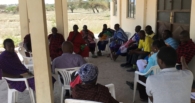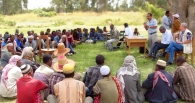Land tenure regularisation in Rwanda
The ‘official view’
Martin Adams
1 October 2013
/
- 0 Comments
For over twenty years, Mokoro has been involved in the planning, assessment and evaluation of programmes that aim to strengthen people’s rights to land and other natural resources. In the course of our work for governments, funding agencies and international NGOs in East, Central, West and southern Africa, we have advised on land redistribution, on securing the tenure of customary land and on the reform of forest tenure for more sustainable use. We have conducted and evaluated training programmes for land administrators and paralegals and examined the effects of large-scale land acquisition, ‘land grabs’, on the lives of women as well as men. Mokoro now hosts the ‘Land Rights in Africa’ website as a contribution to the land rights dialogue.
As funding agencies have adopted results-based management approaches, we have become increasingly involved in assessing the ‘impact’ of land-related initiatives; a difficult task, even in those cases where prior efforts have been made to conduct baseline surveys. The expectations of planners, as expressed in verifiable indicators in logical frameworks, tend to be overoptimistic about the time needed for changes in people’s lives and livelihoods to become apparent. Clear evidence of the impact of land-related programmes can take years to emerge. A recent assignment to Rwanda to identify evidence and data to assess performance of the Land Tenure Regularisation (LTR) programme illustrates some of these issues.
Rwanda 2013
Professor Patrick McAuslan, a leading authority on land law reform in Africa, says of Rwanda:
In some respects, discussing the land reform laws of Rwanda is the most difficult of the tasks confronting this or indeed any writer surveying land reform policies, laws and practices in Africa. This is quite simply because there are two diametrically opposed points of view about the reforms to land tenure in Rwanda: there is the official view on the reforms and the view of the critics.1[1]
In the course of only four weeks in July and August 2013, although it was my third visit in six years, it was not possible to be sure about the sustainability of recent land tenure reform in Rwanda. However, I do tend to favour the ‘official view’.
The Land Tenure Regularisation (LTR) appears to have been conducted responsibly and transparently in accordance with the principles laid down by the National Land Policy of 2004 and the Organic Land Law (OLL) of 2005. Among other things, these provide for: (a) equal rights to daughters and sons to inherit property belonging to their parents, (b) protection of women’s property rights under legally registered marriages subject to the provisions of family law, and (c) requirements for both women and men to provide consent in the case of sale, mortgage, or exchange of matrimonial property by either partner. I judge the adjudication and registration of some 10.4 million land parcels and the issuance of joint land titles over the period 2009-2013 by the Rwanda Natural Resources Authority (RNRA), with the support of HTSPE Ltd, to be a remarkable achievement for one of the poorest and most densely populated and intensively farmed countries in Africa. It is an undertaking of not only national but also international interest.
Inevitably, there remain important unanswered questions. For example, there are concerns about the outcome of the programme and its consequences for the poorest of the poor and how government will use its powers over land acquisition under the Land Law of 2013 that replaces the OLL of 2005. There are also worries about the sustainability of the land register and whether informal land transactions in rural areas will continue to take place ‘under the radar’ of RNRA. Building the capacity of the system and decentralising the registration process must now receive priority.
Evidence and Data
DFID’s Logframe for ‘Support for Land Tenure Regularisation in Rwanda’ lists the expected impact indicators, the outcomes and the related assumptions, and the planned outputs. Difficulties were faced by project management in populating the impact indicator cells in the LTR logframe. There was no problem in entering details of outputs as the land registration progressed across the country. On the other hand, impact indicators such as numbers of households obtaining finance for farm improvement against land titles and other economic and social indicators are not to be expected in the short term. Recognising the limited scope of the impacts listed in the programme logframe, the TORs for the study required the identification of ‘impacts beyond those captured in the logframe, including economic, social and environmental impacts’.
From the point of view of quantitative evidence and data gaps, the detailed evidence of LTR impact collected by a World Bank survey team is of great interest. However, it was conducted just one year after systematic first registration, at variance with the original programme concept which envisaged several surveys at three-year intervals to collect evidence of longer-term impact. Now that all 10.4 million land parcels have been included in the LTR programme there is no longer the opportunity to assess the impact of the intervention by itself. Thus there is no methodologically rigorous evidence of the longer-term impact of the LTR programme. Provided on-going challenges relating to the sustainability of the land register can be addressed and outstanding questions about the impact of LTR can be satisfactorily answered ‘qualitatively’, the LTR programme probably will be judged to have been worthwhile, but only time will tell.
There are increasing numbers of useful qualitative assessments of particular aspects of the LTR programme produced by academic researchers and funded by development partners. Such studies may focus on a specific community in a limited geographical area. They provide critical insights concerning the unexpected consequences of land-related legislation and regulations, which often arise in matters relating to land tenure reform. Civil society organisations have undertaken some modest yet significant studies, the lessons of which may have a wider application; for example, The Rwanda Initiative for Sustainable Development (RISD) has conducted investigations on the impact of land lease fees on owners; CARE International has harvested valuable information from focus group discussions on issues relating to land disputes, in advance of the LTR process. The USAID-funded LAND Project actively supported Rwandan researchers in undertaking valuable applied research.
[1] “Land Law Reform in Eastern Africa: Traditional or Transformative? by Patrick McAuslan, Routledge, 2013 (page 127)
You must be logged in to post a comment.



